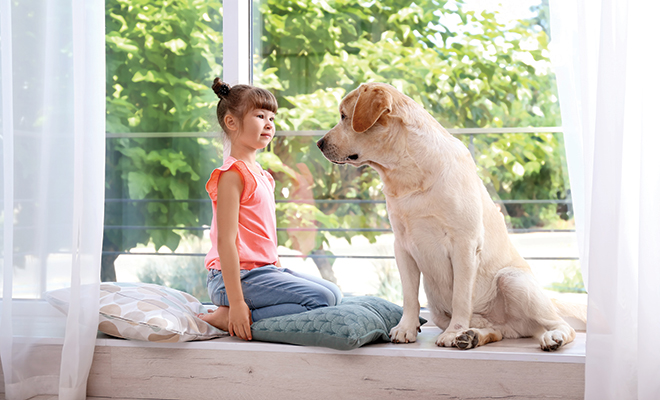
For Kids with Autism, These Special Dogs Can Make All the Difference
A little more than two years ago, 13-year-old Sarah William’s life changed for the better. She has autism and has a high level of anxiety, especially during transitions. Even minor changes in her environment, such as trips into public spaces, were hard for her. Since she’s part of a military family, with moves every two or three years, she was frequently forced into completely new surroundings.
Her mother, Carrie Williams, had wanted to get her daughter a service dog since Sarah was six, but there was a long waiting list. “We thought a service dog would help, with teachers and classmates and out in public,” she said. “We’d get on a list and then we’d get transferred.”
The family had been relocated to northern Virginia when they heard about Service Dogs of Virginia, an organization that trained assistance dogs for autistic children. She decided to try again. “We lucked out. We waited six months and when Sarah was 11, we ended up with an 80-pound Labrador retriever named Teak.”
There are three kinds of dogs trained for service: therapy animals, emotional support animals and assistance animals. Therapy animals are often personal pets trained to visit places such as hospitals and nursing homes. Emotional support animals support one individual, helping them with various kinds of anxiety. Assistance animals are highly trained and include dogs for the blind, the hard-of-hearing and people with seizure disorders or diabetes.
Teak is an assistance dog, trained to aid people with autism. Assistance dogs wear a vest and are allowed by law to enter stores, restaurants and to fly in the passenger cabins of planes. When the Williams family was relocated from Virginia to Hawaii, Teak flew next to Sarah for the nine-hour flight. “Life is completely different,” said Sarah’s mother. “It’s freed us to go out into the community. The idea of going to a fair or a farmer’s market—we couldn’t do it. She’d pull away and scream. Now, we have an opportunity to engage in the community. With Teak, she’s more able to go places.”
Williams says that dog and daughter bonded immediately. When the family traveled the 100 miles from their home to pick up Teak, “Sarah was freaking a little, wanting to leave. Then Teak came over and made an instant connection.” During the drive home, Sarah snuggled with her new friend. “Teak’s amazing. He goes with the flow. He hops up into her bed so she can pet him. She grabs him and pulls her to him and he licks her face. She loves him.”
Many assistance dog organizations look to specialized individual breeders for their dogs. Labradors and a Labrador/poodle mixed breed, often referred to as Labradoodles, are the most popular. Theses are generally large, gentle dogs and easy to train.
Organizations such as Can-Do Canines, servicing the Minnesota and Wisconsin area, have trained dogs to help autistic children since 2007. The demand is high. Can-Do Canines has a waiting list of 180, with wait times up to three years. They, as many of the assistance dog organizations, are in need of volunteers such as Kelly Lindemann and her family, who foster the dogs that will someday be placed with a family.
“We get the dogs at about eight to ten weeks old. We give them basic obedience until they are called in for final training and then are placed,” she said. “I had one dog, Yummy, for about two years. We took her into the community. I’m a second-grade teacher and took her to school with me. She met 400 kids who now know not to talk to assistance dogs. And, my own kids got college scholarships because of their activities with Can-Do Canines.
Yummy ended up with a first-grade girl who, Lindermann said, also bonded immediately with her new dog. “The first night, she fell asleep right away and slept through the night for the first time”.
Kona, a yellow Labrador, also from Can-Do Canines, was placed with Preston Laase, who lives with his family in a suburb just north of the Twin Cities. “Preston is a runner,” said his mother, Nichole Laase. “We live on a busy road and Preston would run if we didn’t have locks on the doors. Before, when we went out, he’d run away or have meltdowns. We couldn’t go anywhere, and now we can. People see Kona in the vest and know Preston’s not just a naughty kid. We can hear them in the mornings. He lets Kona out and feeds him before he goes to school. They love to play tug-of-war. It’s 100 percent worth it. It’s changed our lives.”
While not all service dog organizations train dogs for autism support, Assistance Dogs International is the leading authority, listing nearly 80 accredited American groups that meet their high standards for training. If you can foster, contact one; it will be worth it! ■
Sources: assistancedogsinternational.org, can-do-canines.org, servicedogsva.org, saintfrancisdogs.org and freedomservicedogs.org.







